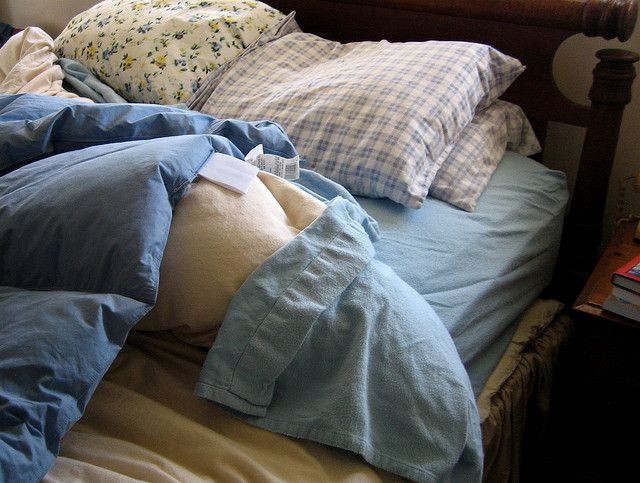National Make Your Bed Day: Making Your Bed Linked To Increased Productivity, But May Also Stimulate Dust Mite Populations

Those who make their beds and those who prefer to leave it messy usually don't make the best roommates, but when it comes to which one is right, the jury is still out. Surprisingly, science shows that neither habit is necessarily better than the other, with evidence suggesting that making your bed may increase productivity and happiness, but leaving it undone may be better for your physical health.
Leave That Bed Messy
People who choose to leave their bed unmade may be viewed as lazy, but as a 2006 study showed, they may actually be onto something. According to the study, conducted by researchers from Kingston University in England, leaving your bed unmade helps to prevent the presence of allergen and asthma-causing dust mites.
The common household dust mite, also known as the bed mite, is a tiny insect less than a millimeter long that likes to live in pillows, mattresses, carpets, and general household furniture. It feeds on the leftover skin that humans are constantly shedding, and the average bed can host as many as 1.5 million of these tiny pests. According to the American College of Allergy, Asthma, & Immunology, these unwanted house guests are one of the most common causes of childhood asthma and exist regardless of whether your house is visibly dirty or sparkling clean.
As anyone who’s ever woken up sticking to their sheets has noticed, we sweat a lot while sleeping. According ot Stephen Pretlove, lead study researcher, dust mites can only survive in warm, damp conditions and live by "taking in water from the atmosphere using small glands on the outside of their body," the BBC reported. Our moist, warm bed sheets are the ideal environment for these home invaders.
For the study, the team used a computer model to track how changes in the home environment could affect dust mite numbers, and learned something surprising. Leaving your bed unmade throughout the day can help to remove the moisture from the sheets and mattress and thus kill off your bed’s mite population. According to Pretlove, this simple yet effective method of reducing dust mite populations may help to reduce the number of dust mite-related conditions.
In Defense Of Tidiness
Leaving an unmade bed can reduce dust mite populations, but there are still valid reasons to go on and still make your bed each morning. In his commencement speech at the University of Texas, U.S. Navy Adm. William H. McRaven suggested that making your bed can increase your productivity for the rest of the day.
“If you make your bed every morning, you will have accomplished the first task of the day,” he said. “It will give you a small sense of pride, and it will encourage you to do another task, and another, and another. And by the end of the day that one task completed will have turned into many tasks completed.”
McRaven isn’t the first to link making your bed to increased productivity. Charles Duhigg, a Pulitzer Prize-winning reporter at The New York Times and author of The Power of Habit suggested that something as simple as making your bed every morning correlates with “a greater sense of well-being and stronger skills at sticking with a budget,” because it helps to start a chain reaction of good decisions, he explained in his book.
Gretchen Rubin, author of The Happiness Project and Happier at Home, found that completing everyday tasks significantly increased people's happiness. “When I was researching my book on happiness, this was the number one most impactful change that people brought up over and over,” Rubin told RealSimple. According to Rubin, making your bed in the morning is an easy way to ensure that you start your day on a positive note.
So there you have it: On the one hand, leaving your bed unmade may help to alleviate your allergy symptoms, but on the other hand, keeping your sleeping area tidy may increase your overall happiness and be the catalyst to help you do anything you set your mind to. Which side do you stand with?
Source: Pretlove S, Crowther D, Wilkinson T, Biddulph P, Oreszcyn T, Ridley T. A simple model for predicting the effect of hygrothermal conditions on populations of house dust miteDermatophagoides pteronyssinus (Acari: Pyroglyphidae). Experimental & Applied Acarology. 2006.
Published by Medicaldaily.com



























